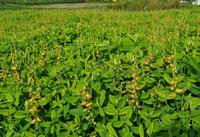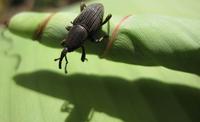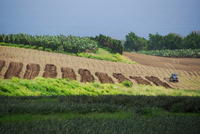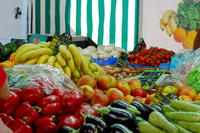Conference sessions
The symposium will be structured around five complementary sessions. Each will cover different aspects of agroecology ranging from theoretical and innovative scientific knowledge from concrete applied cropping practices.
Session A: Sharing the concepts of agroecology and illustrating their usage
(Ecological intensification, ecosystem services, indicators, agroecosystem health)
Keynote speakers: Dr Manuel Blouin, Dr Stéphane Declerck and
Dr Martina Koberl
This session will target presentations on the basic principles and concepts of agroecology, along with illustrations
of the ways they can be harnessed through practical applications. The session aims to share recent advances made on the means to mobilize agroecosystems’ functionalities for optimising their productivity and increasing their sustainability. Some examples will be borrowed from crops other than bananas (including tropical or non-tropical crops) in order to extend our reference framework and further illustrate how to fill in the gap between agroecological theoretical concepts and principles and their concrete application.
Session B: Managing plant diversity to ensure ecosystem services
(Selection methods, new banana varieties, rotation crops, associated crops, functional/quality traits)
Keynote speaker: Dr Paolo Bàrberi and Fabrice Declerck
Plant diversity is critical to ensuring ecosystem services and is a major driver of ecosystem processes associated for instance with soil fertility, nutrient cycling, or pest and disease biocontrol. The management of interspecific and intraspecific plant diversity in banana agroecosystems contributes to promote ecosystem services and to enhance their resilience to global environmental changes. This session will address various aspects of the management of plant diversity: practical plant biodiversification approaches including intercropping, crop rotations, cover crops, functional approaches for selecting plant promoting ecological services, innovative breeding strategies for promoting ecological services, insertion of new banana varieties in diversified cropping systems, integrative modelling tools, and so forth. The session will also focus on the means to accommodate quality traits of food products within varietal innovation strategies designed for ecologically intensified banana cropping systems.
Session C: Enhancing biological regulations in banana cropping systems (field level)
(Biocontrol, cover crops, systemic acquired resistance, diagnostic methods, ipm, suppressive soils)
Keynote speaker: Dr Philippe Tixier and Dr Sara Sanchez-Moreno
Agroecological plant protection relies on effectively harnessing interactions between plants, environment and human actions in agrosystems, thus limiting the need for chemical control. This session will focus on the biological regulation of air- or soil-borne banana pests and diseases. “Biological regulation” refers here to any regulation resulting from applying biocontrol methods to increase the value of natural mechanisms. These biocontrol methods include the manipulation of micro-organisms (bacteria, fungi, etc.), and the use of organisms from meso- and macro-fauna (nematodes, arthropods etc.). They also deploy pheromones, natural substances such as defence elicitors, or cover crops promoting ecosystem services. This session will also focus on cultural practices that are aimed at (i) limiting the life cycle speed of pests and diseases (via prophylaxis, barriers to dispersal, spatial arrangements of plants, microclimate modifications, etc…), or (ii) strengthening plant tolerance to pests and diseases (via plant nutrition and plant growth, harvest date, source-sink ratios, etc.). All communications dealing with this large definition of biological regulations are welcome, including those related to the impact of agroecological approaches on the quality of food products.
Session D: Improving soil functioning through optimizing mineral and water resource use (field level)
(Nutrient cycling, carbon sequestration, water use, soil health, fertilization)
Keynote speaker: Dr Jean-Luc Chotte
This session will be devoted to innovative knowledge and agroecological practices ensuring the conservation of soil mineral and water resources, and improving their use efficiency for productive and sustainable banana environments. It therefore will include findings on the mechanisms and implementation of agroecological practices that promote favorable soil structure formation, aggregate stability, resistance to soil erosion, ability to control compaction, nutrient cycling, nutrient use efficiency and biologically enhances nutrient acquisition, carbon sequestration and reduction in greenhouse gas emissions, water storage and regulation in banana systems. It may also include information on how practices could reduce soil function and ecosystem services (disservices), emphasizing the need for change.
Session E: Processes, multi-criteria assessment of performances, and contextual factors driving stakeholder strategies (at farm, landscape or higher levels)
(Life cycle assessment, sustainability assessment, economic analyses, environmental impact, markets)
Keynote speakers: Dr Christian Bockstaller and Mr Sébastien Zanoletti
Harnessing more effectively ecological processes for productive, profitable and resilient banana cropping systems depends first on identifying the limits and potential of current systems. This diagnostic of the agroecological potential provides a guide to undertake a stepwise transformation, a progressive integration of new knowledge and practices, biodiversity and knowledge-intensive inputs. This session will start with presentations documenting this process from diagnostics to prototype development and the multi-criteria assessment of their performances, to more widespread use and outcomes. Cases will possibly cover transition from conventional monocultural systems, organic banana monocrops, smallholder mixed food and perennial cropping with bananas, and agroforestry- based cropping systems. The session will then consider the contextual factors driving agroecological intensification including prices, markets, regulation on food safety, labor and environment, and strategies for monitoring and certification. The session will thus allow taking stock of experiences and studies of factors in those broader contexts where stakeholders implement agroecology. The conveners of the session also encourage presentations on methods and experiences on certification and impact assessment at different scales and in different production contexts – organic, fair trade, conventional for national and international markets.





